Food for thoughts

Sept. 25, 2024
Organization of scientific events
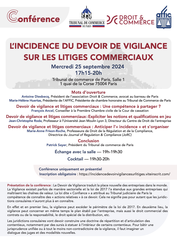
🌐follow Marie-Anne Frison-Roche on LinkedIn
🌐subscribe to the Newsletter MAFR Regulation, Compliance, Law
____
► Full Reference: M.-A. Frison-Roche, coordination of the conference L'incidence du devoir de vigilance sur les litiges commerciaux (The impact of the duty of vigilance on commercial litigation), Tribunal de commerce de Paris (Paris Commercial Court), Droit & Commerce and Association Française en Faveur de l'Institution Consulaire (AFFIC), Tribunal de commerce de Paris, 25 September 2024, 5.15p.m. to 8p.m.
____
🧮see the full programme of this event
____
🌐consult on LinkedIn a general présentation of this event (in French)
____
► General presentation of the conference: The Duty of Vigilance reflects the new role of firms in the world. Vigilance sometimes existed on a sectoral basis, but the 2017 French law extended it to large companies that control value chains. The French so-called "confiance" law gave the Tribunal judiciaire de Paris (Paris First Instance Civil Court) jurisdiction to hear "actions relatives" ("actions relating") to this duty. This does not mean, however, that the commercial courts will no longer have jurisdiction.
Firstly, vigilance may go beyond the scope of the 2017 French law. Secondly, vigilance may concern not only the plan drawn up by the firm, but also Commercial Contract Law or Liability Law, special Distribution Law, etc.
Commercial courts will have to develop a doctrine for dividing up and coordinating disputes, in particular by staying proceedings within certain disputes. To build a unified or at least non-contradictory case law on vigilance, we need to imagine a dialogue between judges and new procedures.
____
🧮Programme of this event:
L'INCIDENCE DU DEVOIR DE VIGILANCE SUR LES LITIGES COMMERCIAUX
(THE IMPACT OF THE DUTY OF VIGILANCE ON COMMERCIAL LITIGATION)
Paris First Instance Commercial Court, room 1
🕰️5.15pm.-5.30pm. Welcome
🕰️5.30pm.-5.40pm. 🎤Mots d'ouverture (Opening words), by 🕴️Antoine Diesbecq, President of Droit & Commerce, attorney at the Paris Bar and 🕴️Marie-Hélène Huertas, President of AFFIC, Honorary President of Chamber of the Paris First Instance Commercial Court
🕰️5.40pm.-6pm. 🎤Devoir de vigilance et litiges commerciaux : Une compétence à partager ? (Duty of Vigilance and Commercial Litigation: A jurisdiction to share?), by 🕴️François Ancel, Judge at the Première Chambre civile de la Cour de cassation (First Civil Chamber of the French Court of cassation)
🕰️6pm.-6.20pm. 🎤Devoir de vigilance et litiges commerciaux : Expliciter les notions et qualifications en jeu (Duty of Vigilance and Commercial Litigation: Explain the concepts and qualifications involved?), by 🕴️Jean-Christophe Roda, Full Professor at Jean Moulin Lyon 3 University, Director of the Centre de Droit de l’entreprise
🕰️6.20pm.-6.40pm. 🎤Devoir de vigilance et litiges commerciaux : Anticiper l''incidence" et s’organiser (Duty of Vigilance and Commercial Litigation: Anticipating the "impact" and getting organised), by 🕴️Marie-Anne Frison-Roche, Professor of Regulatory Law and Compliance Law, Director of the Journal of Regulation & Compliance (JoRC)
🕰️6.40pm.-7pm. 🎤Conclusion (Conclusion), by 🕴️Patrick Sayer, President of the Tribunal de commerce de Paris (Paris First Instance Commercial Court)
🕰️7pm.-7.30pm. Discussion with the audience
🕰️7.30pm.-8pm. Cocktail
________
Sept. 24, 2024
Thesaurus : 02. Cour de cassation
Sept. 23, 2024
Interviews
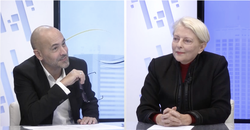
🌐suivre Marie-Anne Frison-Roche sur LinkedIn
🌐s'abonner à la Newsletter MAFR. Regulation, Compliance, Law
🌐s'abonner à la Newsletter Surplomb, par MAFR
____
► Référence complète : M.-A. Frison-Roche, "L'indispensable dialogue entre le droit et la gestion", entretien mené par J.-Ph. Denis à l'occasion d'une série d'entretiens sur le Droit de la Compliance, in Fenêtres ouvertes sur la gestion, émission de J.-Ph. Denis, Xerfi Canal, enregistré le 12 décembre 2023, diffusé le 23 septembre 2024
____
🌐consulter sur LinkedIn la présentation en décembre 2023 de l'entretien
____
🌐consulter sur LinkedIn la vidéo de l'entretien
____
🎥visionner l'interview ci-dessous⤵️
____
🧱consulter la présentation générale de cette série d'entretiens sur le Droit de la Compliance
____
🎥visionner l'interview complète sur Xerfi Canal
____
► Point de départ : depuis 2016, Marie-Anne Frison-Roche construit le Droit de la Compliance, notamment par une collection coéditée en français avec les Editions Dalloz et coéditée en anglais avec les Editions Bruylant :
🧱lire la présentation de la collection en langue française, 📚Régulations & Compliance
🧱read the presentation of the series in English, 📚Compliance & Regulation
____
► Résumé de l'entretien :
Jean-Philippe Denis. Question : Pourquoi Droit et Gestion doivent dialoguer ?
Marie-Anne Frison-Roche. Réponse. : Pour des impératifs pratiques. Aujourd'hui, l'on demande au Droit de sortir de ses frontières en réglant la façon dont les entreprises, à travers les chaînes de valeur qu'elles ont construit, doivent faire en sorte qu'effectivement les droits humains ne soient pas atteints. Pour pouvoir remplir ces nouvelles obligations, les entreprises doivent renouveler leur gouvernance, ce qui relève de la Gestion et non du Droit. Le Droit doit ainsi trouver de nouvelles méthodes, de nouveaux raisonnements, en s'alliant avec la Gestion.
Dans un second temps, comme les juristes n'ont appris que le Droit, il reviendra aux avocats d'aller expliquer ces concepts aux juges, afin que ceux-ci les intègrent dans leur façon de juger. On voit donc ici ce que la Gestion peut apporter au Droit.
___
J.-Ph D. Q. : Loi Pacte, société à mission, RSE, derrière c'est la question de la responsabilité qui se pose et qui unit Droit et Gestion ?
MaFR. R. : Il n'y a pas que la responsabilité qui unit Droit et Gestion. Mais si l'on prend la responsabilité, celle-ci est en train d'être renouvelée dans son concept même.
Historiquement, elle avait été pensée dans son rapport à la morale. On disait qu'il fallait punir ceux qui avaient commis une faute, car il y avait eu une intention de nuire, tout cela étant tourné vers le passé. Cette conception demeure et est par exemple la base du Droit pénal.
Aujourd'hui l'on dit aussi, en plus de cela, que les acteurs en position d'agir doivent avoir conscience de leur position et de leur puissance et qu'il faut d'avantage penser en termes de responsabilisation. Cela implique pour l'entreprise de maîtriser sa puissance et de l'utiliser pour que le monde soit meilleur (responsabilité sociétale), d'utiliser sa liberté, sa volonté, pour exprimer sa fonction dans le monde de demain (entreprise à mission). On dit aussi aux entreprise qu'elles sont des groupes d'être humains, conception moins formelle que celle traditionnellement retenue en Droit, et qu'en conséquence elles doivent se définir en tant que groupe interne et analyser leur rapport à l'extérieur. Ce sont des conceptions de Gestion.
________

Sept. 20, 2024
MAFR TV : MAFR TV - Overhang

🌐suivre Marie-Anne Frison-Roche sur LinkedIn
🌐s'abonner à la Newsletter MAFR. Regulation, Compliance, Law
🌐s'abonner à la Newsletter Surplomb, par MAFR
____
► Référence complète : M.-A. Frison-Roche, "De quoi la nouvelle chambre du TJ Paris est-elle le signe ?", in série de vidéos Surplomb, 20 septembre 2024
____
🌐visionner sur LinkedIn cette vidéo de la série Surplomb
____
____
🎬visionner ci-dessous cette vidéo de la série Surplomb⤵️
____
Surplomp, par mafr
la série de vidéos dédiée à la Régulation, la Compliance et la Vigilance
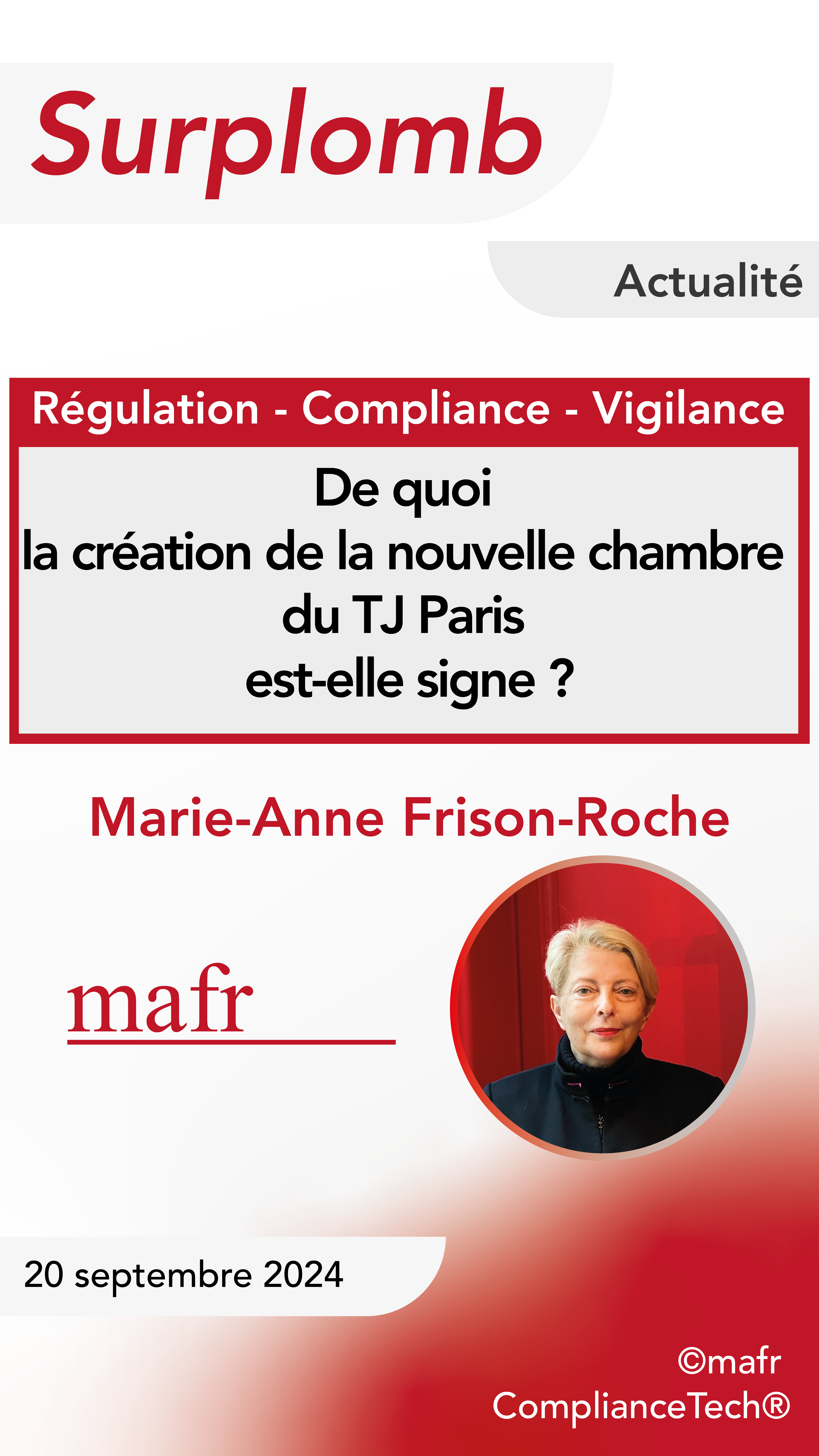

Sept. 19, 2024
Conferences

🌐follow Marie-Anne Frison-Roche on LinkedIn
🌐subscribe to the Newsletter MAFR Regulation, Compliance, Law
____
► Full Reference: M.-A. Frison-Roche, "Comment s’adapter au Contentieux Émergent de la Compliance" ("How to adapt to Emerging Compliance Litigation"), in , Association nationale des juristes de banque (ANJB), September 19, 2024, Paris,
____
This conference is being held with another speaker, Maître Jean-Pierre Picca.
It is followed by a discussion with the audience.
____
🧮see the full programme of this manifestation
____
► English Summary of this conference: Compliance Law is a new branch of Law, teleological in nature, whose legal normativity is rooted in its goals.These are systemic goals of preserving systems by detecting the risks that weaken them and preventing the failures that can destroy them. It is therefore an Ex Ante branch of Law, the implementation of which will weigh on the "entities" in a position to detect risks and prevent failures so that these systemic goals are achieved. As such, they are "Monumental Goals" in that they are political goals aimed at complete systems. It is therefore essential to distinguish between "conformity Law", which simply consists of "complying" with the applicable regulations, and Compliance Law, which consists of contributing to the achievement of these "Monumental Goals", either by force (legal obligation) or by choice (raison d'être, company with mission, contractual obligation, CSR). In this respect, Compliance Law is both much more limited in its aims and much more ambitious, since it is about building the future rather than mechanically complying with regulations.
The banking sector, which can be considered an exception to the principle of Competition, which is based on extreme mobility and the absence of rents, the destruction of the weakest, risk-taking, the lack of solidity of the operator posing no problem, appears to be the paragon of the principle of Compliance, which is based on the sustainability of systems ensured by the solidity of the operators themselves, their solidarity, the exchange of information, and integrated supervisors. For example, the duty of vigilance and the information about others, and the Regulation through Supervision were born in this sector, which has internalised this sectoral concern in the banks, itself the bearer of a general concern, particularly in the European conception of continental banking. the European Banking Union increasing this concern.
As a result, banks will internalise concerns about the future that go beyond safeguarding the banking sector, such as preventing systemic climate risk or educating the population or safeguarding people in vulnerable situations.
____
The litigation that shall ensue is itself highly specific. The topic of this conference is to provide the keys to understanding how banks must play their part.
Emerging Compliance Litigation is systemic in nature. It is a reflection of the Ex Ante organisation whereby entities are asked to make a contribution to the achievement of Monumental Goals. In a dispute between two opposing parties, an individual or an NGO or a trade union or a municipality or a State and a bank, a conflict arises between what might be called the party claiming to represent the present and future interests of a system, for example the climate system or the social relations system, and the bank which has a legally imposed "compliance obligation" to help protect this system.
The author who described this perfectly was Chaïm Perelman, particularly in his 1978 book, Logique juridique, which describes audience circles.
We need to understand the systemic construction of the judicial instance.
The bank must not let to be confined itself solely to its role as litigant, while the other party, for example an NGO, in its role as guardian of "civil society" or the "climate system" or the "effective equality between human beings", going beyond this first circle between the litigants and brings the system itself into the proceedings.
This is where the adaptation has to take place.
________
This adaptation is procedural, evidentiary and substantive.
The procedural adaptation must take place even before any litigation, since there is a continuum between Ex Ante and Ex Post, with the Judicial System itself being just one accountability method (rendering of accounts) among others. This accountability takes place in relation to a ‘mission’ that is entrusted to the banks in relation to the goals: prevention, detection and the fight against corruption, money laundering, climate change, etc., by building alliances, making good use of information (knowing how to take it, knowing how not to pass it on, knowing how to pass it on).
The procedure, i.e. the way in which something is done, must reflect a substantial element, in that it engenders a ‘sense of responsibility’: the purpose of Compliance Law is to ‘make powers accountable’ and to build on positions of power. The proper procedure is to make ‘good use of one's power’ for the benefit of others. Techniques for ‘taking others into consideration’ are an essential element. Consideration by the person who agrees to exercise power (the power to finance, the power to gather information, the power to organise together, the power to contract).
Evidentiary’ adaptation: indifference of evidentiary obligations and rights to the procedural position of the parties. The firm has a ‘Compliance Obligation’ even if it is the defendant in the proceedings. The object of proof is given to it by the Monumental Goals that the Law or its own will require it to help achieve. Its burden is to show that it is helping to achieve these goals, by acting for the future (for example, by knowing its customers, or by taking into account the interests of its stakeholders, etc.).
______
► Structure of the speech:
I. The current situation: suffering the harmful consequences of reducing Compliance Law to the mechanics of "conformity".
II. The opportunity for banks to adapt by understanding Compliance Law and going beyond the mechanics of conformity: the European puzzle, its apparent complexity, its architectural clarity (CSRD/CS3D/DSA).
III. The opportunity for banks not to allow themselves to be trapped in proceedings that are merely sanctions, transferred from Ex Post to Ex Ante: the emergence of Systemic Compliance Litigations before the Ordinary Law Courts (French Law of 2017 on Vigilance; Paris Court of appeal decisions of 18 June 2024).
IV. What is expected of banks in Systemic Compliance and Vigilance Litigations before the Ordinary Courts, reflecting the dialogue and action required by Compliance Law (article to be published).
V. The opportunity for banks to adapt to the new evidentiary dimension of emerging Compliance and Vigilance Litigation (article to be published).
VI. The opportunity for banks to adapt to the new Ex Ante dimension of Systemic Compliance and Vigilance Litigation, Litigation which deals with the future (article to be published).
____
► A few bibliographical references:
🕴️M.-A. Frison-Roche, 📝Compliance Law, 2016
🕴️M.-A. Frison-Roche, 📝Compliance and conformity: distinguish them in order to articulate them, 2024
🕴️M.-A. Frison-Roche, 📝Duty of Vigilance: the way forward, 2024
🕴️M.-A. Frison-Roche, 📝Systemic Litigation, 2024
________
Sept. 18, 2024
Thesaurus : Doctrine
► Référence complète : C. Letoublon, "Responsabilité sociale et environnementale des entreprises multinationales : le devoir de diligence et la protection de l’environnement", L. Boisson de Chazournes dir.), L’Effectivité du droit international face à l’urgence écologique, Collège de France, 2024, pp. 127-146.
____
📝cet article est en libre accès : lire l'article
________
Sept. 18, 2024
Thesaurus : Doctrine
► Référence complète : P.-M. Duhamel et Ch. Lapp, "Le mur des investissements publics requis", AJDA , 2024, pp.1745-1750.
____
🦉Cet article est accessible en texte intégrale pour les personnes qui suivent les enseignements du professeure Marie-Anne Frison-Roche.
Sept. 17, 2024
Thesaurus : Soft Law
► Référence complète : TJ Paris, Présidence du tribunal judiciaire, Pôle activité économique et commerciale, 34ème chambre, Communiqué de presse relatif à la création de la 34ème chambre, intitulée "Chambre de la régulation sociale, économique et environnementale", 17 septembre 2024
____
____
🌐visionner sur LinkedIn la vidéo publiée par mafr à ce propos dans la série de vidéos Surplomb
____
📱consulter la vidéo publiée par mafr à ce propos dans la série de vidéos Surplomb
____
📧consulter sur LinkedIn l'article publié par Marie-Anne Frison-Roche dans la Newsletter MAFR. Regulation, Compliance, Law, à propos de la création de cette 34ième chambre du TJ Paris
________

Sept. 9, 2024
Organization of scientific events
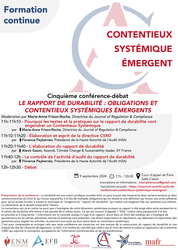
► Full Reference: M.-A. Frison-Roche, Scientific direction of the conference Le rapport de durabilité : obligation et Contentieux Systémiques Émergents (The Sustainability Report: Emerging Systemic Obligations and Litigation), in cycle of conference-debates "Contentieux Systémique Émergent" ("Emerging Systemic Litigation"), organised on the initiative of the Cour d'appel de Paris (Paris Cour of Appeal), with the Cour de cassation (French Court of cassation), the Cour d'appel de Versailles (Versailles Court of Appeal), the École nationale de la magistrature - ENM (French National School for the Judiciary) and the École de formation des barreaux du ressort de la Cour d'appel de Paris - EFB (Paris Bar School) and MAFR, September 19, 2024, 11h-12h30, Cour d'appel de Paris, Cassin courtroom
____
► Presentation of the conférence: Sustainability is a new legal concept, the lineaments of which can be found in certain sectors and branches of Law, and which today has both multiple resulting obligations and a definition that is sufficiently unified to allow it to be grasped through the technique and the requirement of the "Sustainability Report", which translates a requirement linked to the systems themselves. The dual materiality mechanism illustrates this.
The Litigation that will ensue shall be imbued with this systemic dimension, since this report was required from this perspective, and the notion of Sustainability itself was conceived in the same way. What is commonly referred to as "ESG" reflects this perspective, which is both structural and long-term: Information is central here, since it is a Report, anchored in the new conception of Corporate Law that is imbued with Governance, where internal and external stakeholders are present. The various Supervisors and Regulators, who go beyond supervising professionals to regulate activities, are also bound to have a role to play in this Emerging Systemic Litigation.
In order to understand and anticipate this, this conference is built around an analysis of the construction of the Sustainability Report and an analysis of the role of the Regulatory and Supervisory Authority, the French Audit Authority, the Haute Autorité de l'Audit - H2A. These analyses are carried out with a view to the Systemic Litigation that will arise from these new requirements and practices, in correlation with Litigation linked to other fields of Systemic Litigation such as Vigilance field.
____
🧮Programme of this event:
Fith conference-debate
LE RAPPORT DE DURABILITÉ : OBLIGATIONS ET CONTENTIEUX SYSTÉMIQUES ÉMERGENTS
(THE SUSTAINABILITY REPORT: EMERGING SYSTEMIC OBLIGATIONS AND LITIGATION)
Paris Court of Appeal, Cassin courtroom
🕰️11am.-11.10am. 🎤Pourquoi les textes et la pratiques sur le rapport de durabilité vont engendrer un Contentieux Systémique (Why the texts and practices on sustainability reporting will give rise to Systemic Litigation), by 🕴️Marie-Anne Frison-Roche, Professor of Regulatory Law and Compliance Law, Director of the Journal of Regulation & Compliance (JoRC)
➡️read the presentation of this speech
🕰️11.10am.-11.20am. 🎤Élaboration et esprit de la directive CSRD (Elaboration and spirit of the CSRD), by 🕴️Florence Peybernès, President of the Haute Autorité de l'Audit - H2A (French High Audit Authority)
🕰️11.20am.-11.40am. 🎤Comment construire un rapport de durabilité ? (How to build a sustainability report?), by 🕴️Alexis Gazzo, Partner, Climate Change & Sustainability leader, EY France
🕰️11.40am.-12pm. 🎤Le contrôle de l'activité d'audit du rapport de durabilité (The control of the audit of the sustainability report), by 🕴️Florence Peybernès, President of the Haute Autorité de l'Audit - H2A (French High Audit Authority)
🕰️12pm.-12.30pm. Debate
____
🔴Registrations and information requests can be sent to: inscriptionscse@gmail.com
🔴For the attorneys, registrations have to be sent to the following address: https://evenium.events/cycle-de-conferences-contentieux-systemique-emergent/
⚠️The conference-debates are held in person only, in the Cour d’appel de Paris (Paris Court of Appeal).
________
Sept. 9, 2024
Thesaurus : Doctrine
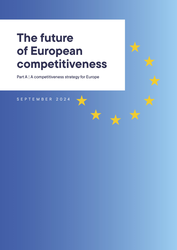
► Référence complète : M. Draghi, The future of European competitiveness, rapport, septembre 2024, 397 p., dit "rapport Draghi"
____
📓lire la première partie du rapport Draghi, A competitiveness strategy for Europe
► Référence complète : M. Draghi, The future of European competitiveness. Part A - A competitiveness strategy for Europe, rapport, septembre 2024, 69 p.
____
📓lire la seconde partie du rapport Draghi, In-depth analysis and recommendations
► Référence complète : M. Draghi, The future of European competitiveness. Part B - In-depth analysis and recommendations, rapport, septembre 2024, 328 p.
________
Sept. 9, 2024
Conferences
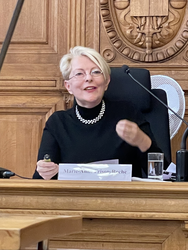
🌐follow Marie-Anne Frison-Roche on LinkedIn
🌐subscribe to the Newsletter MAFR Regulation, Compliance, Law
____
► Full Reference: M.-A. Frison-Roche, "Pourquoi les textes et la pratiques sur le rapport de durabilité vont engendrer un Contentieux Systémique" ("Why the texts and practices on sustainability reporting will give rise to Systemic Litigation"), in Le rapport de durabilité : obligation et Contentieux Systémiques Émergents (The Sustainability Report: Emerging Systemic Obligation and Litigation), in cycle of conference-debates "Contentieux Systémique Émergent" ("Emerging Systemic Litigation"), organised on the initiative of the Cour d'appel de Paris (Paris Cour of Appeal), with the Cour de cassation (French Court of cassation), the Cour d'appel de Versailles (Versailles Court of Appeal), the École nationale de la magistrature - ENM (French National School for the Judiciary) and the École de formation des barreaux du ressort de la Cour d'appel de Paris - EFB (Paris Bar School), under the scientific direction of Marie-Anne Frison-Roche, September 19, 2024, 11h-12h30, Cour d'appel de Paris, Cassin courtroom
____
🧮see the full programme of this event
____
► English summary of the conference: Systemic Litigation refers to a specific category whose proposed category in 2021 refers to "cases" brought before the courts, sometimes specialised, sometimes under ordinary law courts: these are cases in which not only are the parties involved in their dispute but also a system is itself involved, with the procedure and the judge having to allow the interests of the system to be taken into consideration.
However, what is also the subject of new terminology, namely the "Sustainability Report", reflects the same legal revolution: the company must be able to assess not only its economic and financial performance, which is the subject of accounting, but also its development in terms of what it does externally in terms of ESG and what the outside world does about it.
In this perspective, the whole Information System is being transformed, and in different ways depending on the standards adopted, in the United States, Europe or elsewhere, either it is sufficient to obtain Information, no more, so that third parties can adjust their behaviour, mainly investments, or, as in Europe, Law includes a more substantial perspective, so that the company itself adjusts its own behaviour, its Governance, its position in the world, in a renewed relationship with its stakeholders. In Europe, saying and doing are intertwined, CSRD being twinned with CS3D.
Moreover, we can therefore consider that non-financial information, through the sustainability report, its assurance of credibility and the regulation of the audit carried out on it, is itself a system.
The sustainability report, inside the sustainability system, is then interwoven with other systems, which are themselves the subject of Emerging Systemic Litigation: firstly Vigilance, which has been studied as a field of systemic litigation, and then artificial intelligence field, which has been studied in the same way.
The Sustainability Report, insofar as it intersects with the sustainability obligation implied by the duty of Vigilance, may be attracted to the Systemic Litigation to which Vigilance gives rise. In the same way, algorithms can be a tool for data accumulating and matching ESG criteria, which could have the same attraction effect. If this happens, this dimension will have to be present and understood, for example through amici curiae mechanism, in conjunction with the Regulators and the professions concerned.
In addition, as in any emerging mechanism, and as we have seen for example in relation to rating agencies, Tort Law may interfere if the liability of either the company or the person who carried out the audit were to be appreciated, the systemic perspective then having to be integrated into the handling of the case, even before the non-specialised judge.
________
Sept. 5, 2024
Thesaurus : Doctrine
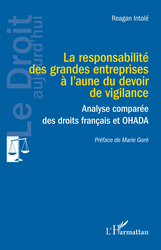
► Référence complète : R. Intolé, La responsabilité des grandes entreprises à l’aune du devoir de vigilance. Analyse comparée des droits français et OHADA, préf. M. Goré, L'Harmattan, coll. "Le Droit aujourd'hui", 2024, 412 p.
____
____
📗lire la table des matières de l'ouvrage
____
► Résumé de l'ouvrage (fait par l'éditeur) : "Le devoir de vigilance prône la responsabilisation des grandes entreprises en matière sociétale et environnementale. En permettant l’appréhension des grandes entreprises et de leurs réseaux dans leur ensemble, il incite toute l’organisation à agir globalement de manière responsable.
L’analyse du devoir de vigilance en droit français fait ressortir que ce dernier s’écarte des solutions classiques du droit de la responsabilité, et cela à au moins deux points de vue. Les normes applicables au devoir de vigilance privilégient une approche fondée sur l’auto-contrôle autonome des entreprises plutôt que sur la répression. En même temps, le devoir de vigilance apporte une logique de contrainte entraînant plus spécifiquement une nouvelle construction du droit de la responsabilité fondée sur la prévention, qualifiée de responsabilité-anticipation.
Il est alors proposé la transposition de ces pratiques qui ont pénétré le droit français en droit de l’OHADA."
________
Sept. 5, 2024
Thesaurus : Doctrine
► Référence complète : U. Öberg, "A ‘General’ Court in Name Only", Concurrences, septembre 2024, n° 3, art. n°119581, pp. 2-6
____
► Résumé de l'article :
____
🦉Cet article est accessible en texte intégral pour les personnes inscrites aux enseignements de la Professeure Marie-Anne Frison-Roche
________
Sept. 2, 2024
Thesaurus : Convention, contract, settlement, engagement
► Référence complète : Convention judiciaire d'intérêt public en matière environnementale (CJIP) entre le Procureur de la République près le Tribunal judiciaire d'Epinal et la société Nestlé Waters Supply Est SAS, 2 septembre 2024, dite "CJIP Nestlé Waters"
____
____
____
____
____
📝commentaires de la CJIP :
- Dalloz actualité, 30 sept. 2024, obs. V. Fihol
________
Updated: Sept. 1, 2024 (Initial publication: )
Thesaurus : Doctrine
► Référence complète : M. Jehl, "The duty of vigilance in the face of practical challenges: audits, contractual assurances, and mediation", IBLJ, 2024, n°3/4, pp. 425-435
____
► Résumé de l'article :
____
🦉Cet article est accessible en texte intégral pour les personnes inscrites aux enseignements de la Professeure Marie-Anne Frison-Roche
________
Aug. 29, 2024
Editorial responsibilities : Direction of the collection "Cours-Série Droit privé", Editions Dalloz (33)
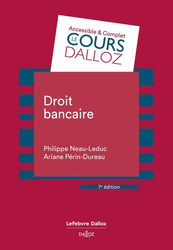
► Référence complète : Ph. Neau-Leduc & A. Périn-Dureau, Droit bancaire, Dalloz, coll. " Cours Dalloz - Série Droit privé", 7ième éd., 2024, 350 p.
____
► Présentation de l'ouvrage : Cette nouvelle édition du Droit bancaire dont Philippe Neau Leduc en était l'auteur, s'adresse à tous les étudiants en Master 1 de droit mais aussi aux praticiens souhaitant actualiser leurs connaissances en droit bancaire.
Il développe dans une première partie "le système bancaire" (secteur et statut bancaire), et dans une seconde partie "le service bancaire" (les opérations de banques et annexes).
____
📕lire la quatrième de couverture
____
____
📚Consulter l'ensemble de la collection dans laquelle l'ouvrage a été publié
____
📚Sont directement corrélés à cet ouvrage :
🕴️S. Piédelièvre, 📕Instruments de crédit et de paiement
________
Aug. 28, 2024
Editorial responsibilities : Direction of the collection "Cours-Série Droit privé", Editions Dalloz (33)
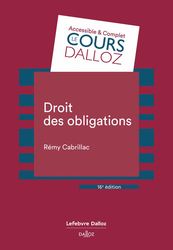
► Référence complète : R. Cabrillac, Droit des obligations, Dalloz, coll. "Cours Dalloz-Série Droit privé", 16ième éd., 2024, 484 p.
____
► Présentation de l'ouvrage : Parfaitement à jour des réformes récentes, le manuel de Rémy Cabrillac raconte en 450 pages le droit des obligations comme une matière vivante et quotidienne. Afin que cette matière demeure compréhensible, sa présentation en demeure classique, une première partie de l'ouvrage est consacré aux sources, la seconde traitant du régime.
Pour le faire, cet ouvrage désormais classique expose ainsi les actes juridiques, les quasi-contrats, la responsabilité civile extracontractuelle, puis les modalités, la circulation et l'extinction des obligations.
____
📚Consulter l'ensemble de la collection dans laquelle l'ouvrage a été publié.
____
📚Sont directement corrélés à cet ouvrage :
📕D. Mainguy, Contrats spéciaux
📕J.-B. Seube, Droit des suretés
📕J.-D. Pellier, Droit de la consommation
__________
Aug. 14, 2024
Editorial responsibilities : Direction of the collection "Cours-Série Droit privé", Editions Dalloz (33)
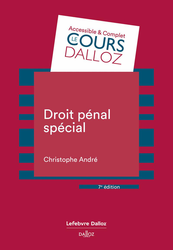
► Référence complète : Ch. André, Droit pénal spécial, Dalloz, coll. "Cours Dalloz - Série Droit privé", 1ière éd., 2010, 7ième éd., 2021, 552 p.
____
► Présentation de l'ouvrage : La 6ième édition de ce Cours est à jour des réformes qui continuellement modifient les infractions pénales, notamment en matière économique et financière mais aussi sociales (par exemple les "gilets jaunes"), montrant avant tout la constante de la crise d'un droit pénal déliquescent et désormais éclaté en droits répressifs spéciaux. Aujourd'hui c'est non seulement un droit pénal spécial mais encore voire avant tout un droit pénal d'exceptions (ce qui pose problème au regard du droit pénal général, lequel est indissociable de la procédure pénal) qu'il faut apprendre, étudiants comme praticiens.
Ce Cours est construit en trois parties.
La première traite des infractions contre les personnes ; la deuxième des infractions contre les biens ; la troisième contres la Nation, l'État et la paix publique.
Les éléments de procédure pénale, indissociables du droit pénal, sont expliqués à chaque infraction explicitée.
____
📕lire la quatrième de couverture
____
📕lire la table des matières
____
📚Consulter l'ensemble de la collection dans laquelle l'ouvrage a été publié
____
📚Sont directement corrélés à cet ouvrage :
________

Aug. 2, 2024
Publications

🌐follow Marie-Anne Frison-Roche sur LinkedIn
🌐subscribe to the Newsletter MAFR Regulation, Compliance, Law
🌐subscribe to the Video Newsletter MAFR Surplomb
____
 ► Full Reference: M.-A. Frison-Roche, Systemic Litigation, Working Paper, July 2024.
► Full Reference: M.-A. Frison-Roche, Systemic Litigation, Working Paper, July 2024.
____
📝Ce This Working Paper has been the basis for an article tot be published in French in the Recueil Dalloz.
____
► Summary of this Working Paper: We are seeing the Emergence of a category of its own and must be designated by a singular expression: 'Systemic Litigation' (I). This category is composed of concrete cases, "Systemic Cases", in which a system is entirely involved. The interest in these systems, insofar as they are all a system, unifies the category and justifies its own procedural, institutional and jurisdictional treatment. This type of Litigation is Emerging for three reasons, which are recorded in the Systemic Cases (II). Systemic Litigation must be dealt with in a way that is both specific and unified. This is beginning to happen and must be expanded (III).
____
🔓read the developments below

Aug. 2, 2024
Publications

🌐follow Marie-Anne Frison-Roche sur LinkedIn
🌐subscribe to the Newsletter MAFR Regulation, Compliance, Law
🌐subscribe to the Video Newsletter MAFR Surplomb
____
 ► Full Reference: M.-A. Frison-Roche, Antitrust, natural field of Systemic Litigation, Working Paper, July 2024
► Full Reference: M.-A. Frison-Roche, Antitrust, natural field of Systemic Litigation, Working Paper, July 2024
____
📝This working paper has been prepared as a basis for the article to be published "Antitrust, natural field of Systemic Litigation" in the Review Concurrences in September 2024
____
► Summary of this Working Paper: Systemic Litigation is a specific category of Litigation in which beyond the dispute between the parties the interest of a System is involved, in particular its future. Competition Law is a natural and long-standing field for this category, which is now emerging strongly for information, climate and energy systems.
It should be remembered that a market is not self-regulating and cannot continue to function in the long term unless it has the benefit of a judge, a figure who is specific in that he/she is both external to it and yet apprehends its specific interest. In order to satisfy this double requirement, liberal legal organisations often entrust the competition authority with jurisdiction over this Systemic Litigation. Ordinary courts will also hear such cases, either on appeal or in other proceedings, and it cannot be claimed that courts are excluded, the systemic dimension of the dispute being expressed by the presence of the competition authority in the proceedings. This explains the procedural rules that are hard to justify otherwise.
The Authority, the European Commission for example, must be able to develop and express the specific interests of the competition system. This special role of the competition authority in this type of litigation, because it is systemic, has been in place for decades and should serve as a model for Systemic Litigation, which is being developed for other systems whose sustainability is now referred to the courts.
____
🔓read the developments below⤵️
July 23, 2024
Thesaurus : Doctrine
► Référence complète : A. Supiot, "L'esprit des lois à l'époque globale", RIDE, 2023, n° 3-4, pp. 5-22
____
► Résumé de l'article (fait par l'auteur) : "La nécessaire critique de la globalisation ne doit pas conduire à céder aux passions identitaires, mais bien au contraire à œuvrer à un nouvel ordre international fondé sur l’apprentissage mutuel et la solidarité des peuples, pour relever ensemble les défis écologiques, sociaux et technologiques des temps présents. Cette voie serait celle d’une véritable mondialisation, qui reconnaîtrait la souveraineté de la limite ainsi que la dette de vie entre générations, et romprait avec l’universalisme en surplomb, sûr d’incarner la raison, pour cultiver un universalisme en creuset, attentif à la diversité des langues, des histoires et des cultures.".
____
🦉Cet article est accessible en texte intégral pour les personnes inscrites aux enseignements de la Professeure Marie-Anne Frison-Roche
________
July 13, 2024
Interviews
🌐suivre Marie-Anne Frison-Roche sur LinkedIn
🌐s'abonner à la Newsletter MAFR. Regulation, Compliance, Law
🌐s'abonner à la Newsletter Surplomb, par MAFR
____
► Référence complète : M.-A. Frison-Roche, "La transformation des entreprises face à la compliance", entretien mené par J.-Ph. Denis à l'occasion d'une série d'entretiens sur le Droit de la Compliance, in Fenêtres ouvertes sur la gestion, émission de J.-Ph. Denis, Xerfi Canal, enregistré le 12 décembre 2023, diffusé le 13 juillet 2024
____
🌐consulter sur LinkedIn la présentation en décembre 2023 de l'entretien
____
🌐consulter sur LinkedIn la vidéo de l'entretien
____
🧱 consulter la présentation générale de cette série d'entretiens sur le Droit de la Compliance
____
🎥visionner l'interview complète sur Xerfi Canal
____
► Point de départ : depuis 2016, Marie-Anne Frison-Roche construit le Droit de la Compliance, notamment par une collection coéditée en français avec les Editions Dalloz et coéditée en anglais avec les Editions Bruylant :
🧱lire la présentation de la collection en langue française, 📚Régulations & Compliance
🧱read the presentation of the series in English, 📚Compliance & Regulation
____
► Résumé de l'entretien :
Jean-Philippe Denis. Question : P
Marie-Anne Frison-Roche. Réponse. :
___
J.-Ph D. Q. : L
MaFR. R. :
________

Updated: July 8, 2024 (Initial publication: Dec. 15, 2023)
Publications

🌐follow Marie-Anne Frison-Roche on LinkedIn
🌐subscribe to the Newsletter MAFR Regulation, Compliance, Law
____
 ► Full Reference: M.-A. Frison-Roche, Duty of vigilance: the way forward, Working Paper, December 2023/July 2024.
► Full Reference: M.-A. Frison-Roche, Duty of vigilance: the way forward, Working Paper, December 2023/July 2024.
____
🎤 This working paper has been drawn up to serve as a basis for the conclusions of the colloquium Le devoir de vigilance: l'âge de la maturité? ("The duty of vigilance: the age of maturity?") organised by the University of Montpellier on 25 May 2023.
_____
📝 Updated and developed, it serves as the basis for the article that concludes the book Le devoir de vigilance des entreprises : l'âge de la maturité? ("The duty of vigilance: the age of maturity?"), Editions Bruylant, 2024.
____
► Working Paper summary: In 2017 in France the so-called Vigilance law expressed great ambition. So did the draft directive. But in 2024 the European institutions moderated this ambition by refusing to increase either the type of companies subject and the constraints to which the duty of vigilance is associated. The directive has essentially halted what was for some the "march of progress". Does the ambition no longer exist? Does the future lie in an extension of the philosophy of the duty of vigilance, i.e. companies that should always be more concerned about others? This would undoubtedly be reaching the "age of maturity", where others see the age of madness, because it would be a contradiction in terms to ask a company to be concerned about anything other than its own development.
It is therefore appropriate to consider this very hypothesis of an "age of maturity" as being an ambition maintained despite a European directive which, in its adopted version, is weakened and while the oppositions are intact (I). First of all, it must be admitted that the notion of "maturity" most often conceals a value judgment when applied to a legal concept (I.A.) and that this is blatantly obvious with regard to the duty of vigilance, which is considered by some and by nature by some as a good and by others as an evil (I.B).
In order not to remain in what appears to be trench warfare, we must not get too bogged down in the reference French legislation of 2017 and what appears to be a European stutter in 2024, arguing so loudly that we can hear them reasoning in print, by paying attention to less visible and now more promising avenues of progress (II). In fact, the duty of vigilance can progress simply by the passage of time (II.A), by a better definition of the vocabulary (II.B), by the consolidation of the principles of Responsibility and Dialogue (II.C), by the uniqueness of the jurisdictional route (II.D).
This last perspective of the progress that will be made possible in France by the uniqueness of the judicial route leads to a final avenue of progress. By their very nature, laws are jolts, all the more violent for being disputed. At the moment, if we want to make progress, these two other sources - the contract and the judge - must be favoured (III). The European directive is rightly concerned with access to the courts and takes a measured view of the effectiveness of contracts as a means of making the duty of vigilance effective, with the courts having to ensure that the contract does not destroy the spirit of the system. This is what the law already organises about the relationship between the contract, the judge and the duty of compliance (III.A). What is new in Europe in 2024 is the introduction of a Supervisor (III.B). Here again, vigilance is the "cutting edge" of Compliance Law, as it is an extension of Regulatory Law.
The result is that, through interpretation and the handling of principles, and to formulate a more general conclusion, it is the judge who holds and will hold the balance of the duty of vigilance.
____
🔓read the Working Paper below⤵️
July 4, 2024
Editorial responsibilities : Direction of the collection "Cours-Série Droit privé", Editions Dalloz (33)
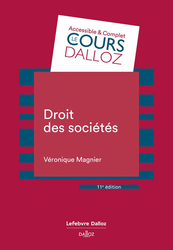
► Référence complète : V. Magnier, Droit des sociétés, Dalloz, coll. "Cours Dalloz-Série Droit privé", 1ière éd., 2002, 11ième éd., 2024, 572 p.
____
► Présentation de l'ouvrage : Cet ouvrage permet d'avoir facilement accès à la compréhension de la matière, il part des règles générales et communes à toutes les sociétés, pour ensuite aller vers les règles spécifiques aux sociétés particulières (SA, SARL, SCI, Société en nom collectif, etc.)
Cette dixième édition traite dans une première partie "le droit commun des sociétés", avec notamment le contrat de société et la personnalité morale de la société, pour ensuite s'intéresser dans une deuxième partie au "droit spécial des sociétés" avec les sociétés de personnes, à responsabilité limitée et de capitaux, pour finir sur le sujet du "groupement des sociétés".
___
► Dans la même perspective du droit des affaires, voir aussi :
🕴️Ch. Neau-Leduc & al.,📕Droit bancaire
🕴️S. Piedelièvre,📕Droit commercial
🕴️G. Beaussonnie,📕Droit pénal des affaires
🕴️S. Piedelièvre,📕Instruments de crédit et de paiement
🕴️F. Gaudu et 🕴️F. Bergeron, 📕Droit du Travail
____
📚consulter l'ensemble de la collection "Cours série - droit privé".
________
July 4, 2024
Thesaurus : Doctrine
► Référence complète : S. Schiller, "La directive sur le devoir de vigilance. Appréciation du champ d’application, des obligations imposées et des sanctions au regard de la loi française", JCP E, n°27, 4 juillet 2024, étude 1207, pp. 16-26
____
► Résumé de l'article (fait par l'auteure) : "Après 3 années de débats, la directive sur le Devoir de vigilance des entreprises en matière de durabilité a été adoptée par les parlementaires européens le 24 avril 2024. Texte de compromis, il contient des avancées majeures vers plus de sécurité, de fraternité et d’égalité. Vu la richesse de ce texte, seuls quelques points seront abordés dans cette étude : tout d’abord les entreprises concernées, puis les obligations imposées et, enfin, les sanctions prévues. La mise en perspective avec la loi vigilance applicable depuis 7 ans permet de mesurer l’importance de ce nouveau texte, même si de nombreux points sont en sus- pens dans l’attente de la transposition.".
____
🦉Cet article est accessible en texte intégral pour les personnes inscrites aux enseignements de la Professeure Marie-Anne Frison-Roche
________